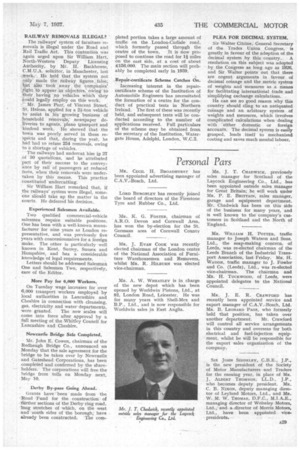RAILWAY REMOVALS ILLEGAL?
Page 31

If you've noticed an error in this article please click here to report it so we can fix it.
The railways' system of furniture removals is illegal under the Road and Rail Traffic Act. This contention was again urged upon Sir William Hart, North-Western Deputy • Licensing Authority, by Mr. H. Bathhouse, C.M.U.A. solicitor, in Manchester, last week. He held that the system not only made the railway figures false, hut also took away , the 'companies' Tight to appear as objectors,' owing to their , having no vehicles which they could legally employ on this work.
, Mr. James Parr, of Vincent Street, St. Helens, applied for a 21-ton vehicle to 'assist in his growing business of household removals; newspaper deliveries to agents, piano transport and kindred work, He showed that the town was poorly served in these reiiipects and that, during the year, he had had to refuse 254 removals, owing to a shortage of vehicles.
The railways had undercut him ip 27 of 30 quotations, and he 'attributed part of their success to the conveyance by rail of passengers at reduced fares, when their removals were under'taken by this means. This practice constituted undercutting.
Sir William Hart remarked that, if the railways' system were illegal, someone should take up the matter in the courts. He deferred his decision, Experienced Salesmen Available.
Two qualified commercial-vehicle salesmen require suitable positions, One has been with a well-known manufacturer for nine years as London representative, and was previously five years with concessionnaires for a foreign make. The other is particularly well known in Kent, Surrey, Sussex and Hampshire, and has a considerable knowledge of legal requirements.
Letters should be addressed Salesman One and Salesmen Two, respectively, care of the Editor.
More Pay for 6,000 Workers.,
On Tuesday wage increases for over 6,000 transport workers employed by local authorities in Lancashire and Cheshire in connection with cleansing, gas, electricity and water departments, were granted. The new scales will come into force after approval by a full meeting of the Whitley Council for Lancashire and Cheshire.
Newcastle Bridge Sale Completed.
Mr. John E. Cowan, chairman of the Redheugh Bridge Co., announced on Monday that the sale agreement for the bridge to be taken over by Newcastle and Gateshead Corporations, has been completed and confirmed by the shareholders. The corporations will free the bridge from tolls on Monday next, May 10.
Derby By-pass Going Ahead.
• Grants have been• made from the • Road Fund for the construction of further sections of the Derby ring road, long stretches of which, on the west and south sides of the borough, have already been constructed. The corn plated portion takes a large amount of traffic on the London-Carlisle road, which formerly passed through the centre of the town. It is now proposed to continue the road for 11 miles on the east side, at . a cost of about £156,000. The main section will probably be completed early in 1939.
• Repair-certificate Scheme Catches On.
Increasing interest in the repaircertificate scheme of the Institution of Automobile Engineers has necessitated the formation of a centre for the conduct of practical tests in Northern Ireland. The first of these was recently held, and subsequent tests will be conducted according to the number of applications received. Full particulars of the scheme may be obtained from the secretary of the Institution, Watergate House, Adelphi, London, W.C.2. PLEA FOR DECIMAL SYSTEM.
Sir Walter Citrine, General Secretary of the Trades Union Congress, is greatly in favour of the adoption of the decimal system by this country. • A resolution on this subject was adopted by the Congress as long ago as 1926, and Sir Walter points out that there are cogent arguments in favour of decimal coinage and the metric system of weights and measures as a means for facilitating international trade and simplifying exchange calculations.
He can see no good reason why this country should cling to an antiquated coinage and an arbitrary system of weights and measures, which involves complicated calculations when dealing with either domestic or, foreign accounts. The decimal system is easily grasped, lends itself to mechanized costing and saves much mental labour.




















































































